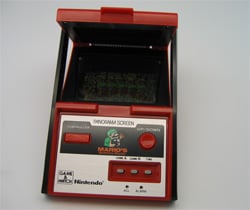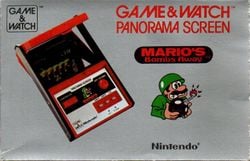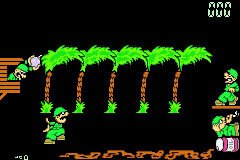Mario's Bombs Away: Difference between revisions
m (Text replacement - "(\|[\n ]*)released([\n ]*=)" to "$1release$2") |
m (Text replacement - "{{MarioGames}}" to "{{Mario games}}") |
||
| Line 44: | Line 44: | ||
<references/> | <references/> | ||
{{ | {{Mario games}} | ||
{{Game & Watch}} | {{Game & Watch}} | ||
[[de:Mario's Bombs Away]] | [[de:Mario's Bombs Away]] | ||
Revision as of 15:25, May 9, 2022
| Mario's Bombs Away | |
|---|---|

| |
| Developer | Nintendo Research & Development 1 |
| Publisher | Nintendo |
| Platform(s) | Game & Watch |
| Release date | November 10, 1983[?] |
| Genre | Retro |
| Rating(s) | N/A |
| Mode(s) | Single player |
| Input | Game & Watch:
|
Mario's Bombs Away is a Game & Watch game released as part of the Panorama Screen series on November 10, 1983.[1] It was later rereleased in its classic form in Game & Watch Gallery 4.
Gameplay
The game involves Mario—a soldier in this game—on a mission to receive a bomb from his buddy on the left side of the screen and carry it to his troop on the other side. Enemy soldiers are waiting in the trees in his path, so he must keep his bomb away from their torches. One of his comrades is the Heavy Smoker, who is a slacker that carelessly tosses burning cigars into a stream of spilled oil, so Mario must also keep it from igniting on the ground. Mario earns a point each time he advances a step to the right while carrying a bomb. When he reaches the other side, he must carefully pass the bomb to his buddy, who will toss it onto one of the five trees, giving Mario five points. After five bombs are tossed onto the trees, they will explode on the enemy, rewarding Mario with 10 points. As time passes, the torches and the fire on the ground will move faster. If Mario's bomb gets lit, he will retreat to his outpost, where the bomb will detonate in his face and blow up his outpost, earning him a miss. If Mario reaches 300 points without any misses, the points will be worth double until he does get a miss. If he has any misses at said score, every miss will be cleared instead. The game ends when he gets three misses. True to the game's wartime jungle setting, Alarm Monkey serves as this unit's time function.
In Game A, the enemy soldiers move their torches down and then up. In Game B, they move their torches only downward, and the game gets faster sooner.
Controls
 (left and right): Move
(left and right): Move : Raise
: Raise : Lower
: Lower
Gallery
Mario artwork
Buddy sprites
Alarm Monkey artwork
Trivia
- Given the jungle setting and the style of uniforms that Mario and the other soldiers are wearing, the war in question was presumably the Vietnam War.
References
- ^ Mario's Bombs Away info page on In The Attic, a website dedicated to classic videogames Retrieved 13 November 2010
| Game & Watch games | ||
|---|---|---|
| Super Mario franchise | Donkey Kong (1982, MS) • Mario Bros. (1983, MS) • Mario's Cement Factory (1983, TT/NWS) • Mario's Bombs Away (1983, PS) • Donkey Kong Hockey (1984, MVS) • Super Mario Bros. (1986, CrS | 1987, Sp | 1988, NWS) • Mario the Juggler (1991, NWS) • Game & Watch: Super Mario Bros. (2020, CoS) | |
| Donkey Kong franchise | Donkey Kong (1982, MS) • Donkey Kong Jr. (1982, NWS | 1983, TT & PS) • Donkey Kong II (1983, MS) • Donkey Kong 3 (1984, MVS) • Donkey Kong Circus (1984, PS) • Donkey Kong Hockey (1984, MVS) | |
| Miscellaneous | Green House (1982, MS) | |
| MS: Multi Screen • TT: Table Top • PS: Panorama Screen • NWS: New Wide Screen • MVS: Micro VS. System • CrS: Crystal Screen • Sp: Special • CoS: Color Screen | ||





